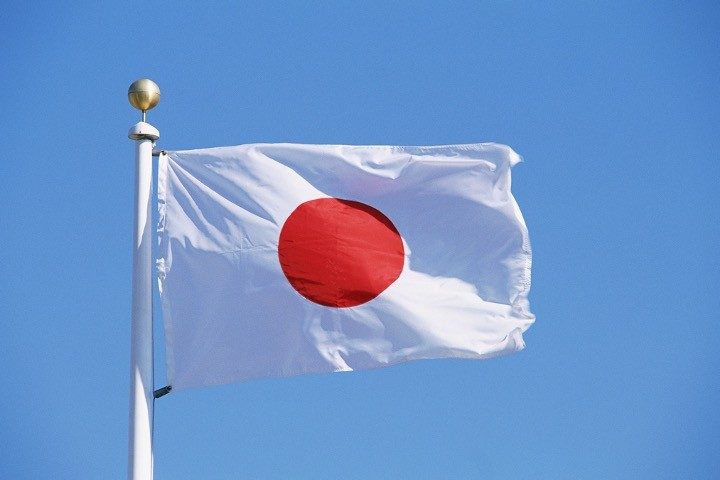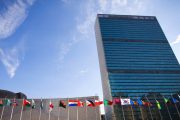
SINGAPORE — Japan’s trade and industry minister announced on Jan. 5 that post-Cold War free trade and economic interdependence have fueled the rise of authoritarian regimes, and hence the U.S. and its allies should tackle them with a “new world order.”
“Authoritarian countries have amassed tremendous power, both economically and militarily,” Economy, Trade and Industry Minister Yasutoshi Nishimura declared in a speech at the Center for Strategic and International Studies in Washington. “We must rebuild a world order based on the fundamental values of freedom, democracy, human rights and the rule of law,” he said.
Nishimura spoke prior to a visit to Washington next week by Japanese Prime Minister Fumio Kishida for discussions slated to include the topics of Ukraine, North Korea, and China’s relations with Taiwan. Before the summit, talks between the defense and foreign ministers of the two countries are expected to happen.
Kishida recently announced that he would discuss Tokyo’s new security policy in light of Japan’s largest military buildup since World War II.
Nishimura’s speech welcoming a “new world order” comes amid growing fears in Japan that Beijing and Moscow will use their advantage in energy resources and persuade manufacturing supply chains to keep the U.S., Japan, Europe, and others from stopping their diplomatic and military goals.
Leaders from the Group of Seven (G7) industrialized nations are likely to talk about possible responses to economic coercion when they gather in May in the Japanese city of Hiroshima, Nishimura said.
“We might need to make preparations to identify the choke points of countries wanting to engage in coercion and then take countermeasures if necessary,” he said, while cautioning that democracies have to safeguard their industrial power and prevent the loss of technologies, especially those that could be channeled to military use.
In addition to advocating for U.S.-Japan collaboration to go beyond semiconductors to biotechnology, artificial intelligence, and quantum science, Nishimura also pledged to cooperate more with Washington on export controls, although he did not mention if Tokyo would enforce the same degree of export restrictions on chip-manufacturing equipment imposed by U.S. President Joe Biden’s administration in October.
“It is … absolutely imperative for us to reinforce our cooperation in the area of export controls,” he said. “We will implement strict export controls grounded in international cooperation while engaging closely in the exchange of views with the U.S. and other relevant countries.”
Nishimura met U.S. Commerce Secretary Gina Raimondo before his Thursday speech. A Commerce Department statement reported that they discussed the importance of cooperating on research and development as well as export restrictions. Nishimura and Raimondo were joined by executives from IBM and Japan’s Rapidus Corp, who shared an outline about their work on semiconductor research.
In October, the Biden administration said it hoped to sign a deal with allies in the near term so they can adhere to sweeping new U.S. rules restricting China’s access to state-of-the-art chipmaking tools in efforts to retard its technological and military progress.
Nishimura met U.S. Trade Representative Katherine Tai on Friday to sign a memorandum to unveil a task force to promote human rights and international labor standards in supply chains, the U.S. Trade Department said.
Japan’s Yomiuri Shimbun newspaper cited Japanese officials as saying that the move was prompted by issues such as alleged coerced labor of minority groups in China’s Xinjiang province. The new body will strive to promote within Japan the regulations that Washington has enhanced to deal with such problems.
After its surrender in World War II, Japan’s economy was in shreds and its infrastructure in major cities was largely bombed out. With many casualties as a result of its battles with the Allied powers and the two atomic bombs dropped in Hiroshima and Nagasaki by the U.S., the defeated nation had to disband its military and renounce war. The following years saw Japan focusing on economic growth under a pacifist constitution.
Japan and the U.S. became formal allies after World War II, thus the U.S. “nuclear umbrella” has protected Japan amid provocations and threats from neighboring China and North Korea. Japanese taxpayers subsidize thousands of U.S. troops who remain based in Japan till this very day.
More than 70 years later, the Russia-Ukraine crisis stoked sentiments in Kishida’s ruling party to urge for a doubling of defense spending over five years. Elevated tension with China over Taiwan has only compounded Japan’s fears of being attacked.
In 2022, ties with nearby Russia plummeted after Japan joined the U.S. and Europe in enforcing sanctions over Russia’s actions in Ukraine. Also, Tokyo and Moscow have been squabbling for decades over four small islands that are situated between their countries.
Traditionally, Japan spends about 1 percent of its gross domestic product (GDP) on defense. While it is not a member of the North Atlantic Treaty Organization (NATO), the ruling party has called for reaching NATO’s target of 2 percent of GDP over five years.
If Japan’s military budget reaches the NATO target, it would rise up six spots and become the third-largest military budget in the world, after the U.S. and China, given Japan’s US$5 trillion economy. Yomiuri reported that the defense ministry was exploring new hardware, including Tomahawk cruise missiles, in its military overhaul.
Japan’s wartime ally Germany, which also harbored a pacifist stance after World War II despite joining NATO, dramatically increased its defense spending as well due to the Ukraine-Russia war in 2022.
The Chinese Foreign Ministry has blamed Japan for promoting an arms race, and has said the country should ruminate on the “untold suffering” it inflicted during World War II. Yet China’s own defense budget has skyrocketed in recent years.
While Japan, which triggered World War II in Asia, has apologized for past misdeeds, some Japanese officials have provoked occasional diplomatic flare-ups by downplaying or dismissing wartime crimes like the Imperial Army’s conscription of Korean women to work in brothels.
South Korea, which was colonized by Japan even before World War II, is in a more complicated situation now. Like Japan, it is also a U.S. ally, and South Korea’s president, who took power in 2022, has pushed for reconciliation with Japan.



